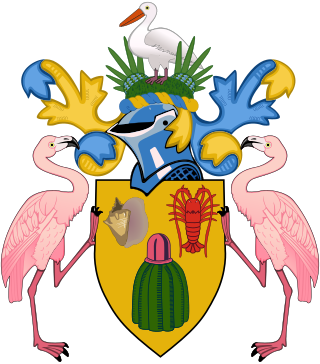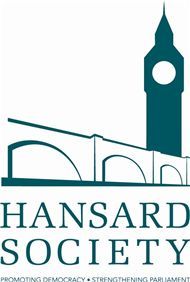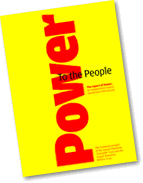
The Treasurer of Australia is a high ranking official and senior minister of the Crown in the Government of Australia who is the head of the Ministry of the Treasury which is responsible for government expenditure and for collecting revenue. The Treasurer plays a key role in the economic policy of the government. The current Australian Treasurer is Jim Chalmers whose term began on 23 May 2022.

E-democracy, also known as digital democracy or Internet democracy, uses information and communication technology (ICT) in political and governance processes. The term is credited to digital activist Steven Clift. By using 21st-century ICT, e-democracy seeks to enhance democracy, including aspects like civic technology and E-government. Proponents argue that by promoting transparency in decision-making processes, e-democracy can empower all citizens to observe and understand the proceedings. Also, if they possess overlooked data, perspectives, or opinions, they can contribute meaningfully. This contribution extends beyond mere informal disconnected debate; it facilitates citizen engagement in the proposal, development, and actual creation of a country's laws. In this way, e-democracy has the potential to incorporate crowdsourced analysis more directly into the policy-making process.

In the United Kingdom, the Electoral Commission is the national election commission, created in 2001 as a result of the Political Parties, Elections and Referendums Act 2000. It is an independent agency that regulates party and election finance and sets standards for how elections should be run.

Politics of the Turks and Caicos Islands takes place in a framework of a parliamentary representative democratic dependency, whereby as of August 9, 2006 the Premier is the head of government, and of a multi-party system. The islands are an internally self-governing overseas territory of the United Kingdom. The United Nations Committee on Decolonization includes the Turks and Caicos Islands on the United Nations list of non-self-governing territories. Executive power is exercised by the government. Legislative power is vested in both the government and the Legislative Council.

Youth empowerment is a process where children and young people are encouraged to take charge of their lives. They do this by addressing their situation and then take action in order to improve their access to resources and transform their consciousness through their beliefs, values, and attitudes. Youth empowerment aims to improve quality of life. Youth empowerment is achieved through participation in youth empowerment programs. However scholars argue that children's rights implementation should go beyond learning about formal rights and procedures to give birth to a concrete experience of rights. There are numerous models that youth empowerment programs use that help youth achieve empowerment. A variety of youth empowerment initiatives are underway around the world. These programs can be through non-profit organizations, government organizations, schools or private organizations.

The Hansard Society was formed in the United Kingdom in 1944 to promote parliamentary democracy. Founded and chaired by Commander Stephen King-Hall, the first subscribers were Winston Churchill and Clement Attlee. The society's co-presidents are the Speaker of the House of Commons, Sir Lindsay Hoyle, and the Lord Speaker, Lord McFall of Alcluith, and the vice-presidents are the leaders of the Labour, Conservative and Liberal Democrat parties. The society is named after the Hansard parliamentary record, which publishes the proceedings of the British parliament.

Civic engagement or civic participation is any individual or group activity addressing issues of public concern. Civic engagement includes communities working together or individuals working alone in both political and non-political actions to protect public values or make a change in a community. The goal of civic engagement is to address public concerns and promote the quality of the community.
The Public Administration and Constitutional Affairs Select Committee, formerly the Public Administration Select Committee, is a select committee appointed by the British House of Commons to examine the reports of the Parliamentary and Health Service Ombudsman, and to consider matters relating to the quality and standards of administration provided by civil service departments, and other matters relating to the civil service, mostly for England and Wales, and constitutional affairs.

The POWER Inquiry was established in 2004 to explore how political participation and involvement can be increased and deepened in Britain. Its work is based on the primary belief that a healthy democracy requires the active participation of its citizens.
The UK Statistics Authority is a non-ministerial government department of the Government of the United Kingdom responsible for oversight of the Office for National Statistics, maintaining a national code of practice for official statistics, and accrediting statistics that comply with the Code as National Statistics. UKSA was established on 1 April 2008 by the Statistics and Registration Service Act 2007, and is directly accountable to the Parliament of the United Kingdom.
The Youth Citizenship Commission (YCC) was a commission created in the United Kingdom to promote youth participation in the political process and to foster youth education in citizenship, in response to the July 2007 publication of the 'Governance of Britain' Green Paper, which pointed out such needs. The thirteen independent Commissioners, headed by chair Professor Jonathan Tonge, oversaw the commission. Among the commissioners were three youth participants.

The term digital citizen is used with different meanings. According to the definition provided by Karen Mossberger, one of the authors of Digital Citizenship: The Internet, Society, and Participation, digital citizens are "those who use the internet regularly and effectively." In this sense a digital citizen is a person using information technology (IT) in order to engage in society, politics, and government.

The Research Foundation for Governance in India (RFGI) is a think tank based in Ahmedabad, India, with the aim to research, promote, and enact legal and political changes in Gujarat and across India. RFGI acts as a consultant to help implement government reforms. The Foundation researches issues for legal reform in law and governance. It also sponsors public events to raise awareness, especially among youth.

Sonia Livingstone is a leading British scholar on the subjects of children, media and the Internet. She is professor of Social Psychology and former head of the Department of Media and Communications at the London School of Economics and Political Science. Livingstone has authored or edited of twenty-four books and hundreds of academic articles and chapters. She is known for her continued public engagement about her research areas and has advised the UK government, European Commission, European Parliament, UN Committee on the Rights of the Child, OECD, ITU and UNICEF, among others, on children’s internet safety and rights in the digital environment.

In England, regional ministers were appointed from 2007 on a part-time basis as part of Her Majesty's Government. Each minister had other departmental responsibilities, as well as specific responsibilities for one of the English regions. Their stated role was "to provide a clear sense of strategic direction for the nine English regions and to help strengthen their links with central government."

Reform of local government in Northern Ireland saw the replacement of the twenty-six districts created in 1973 with a smaller number of "super districts". The review process began in 2002, with proposals for either seven or eleven districts made before it was suspended in 2010. On 12 March 2012, the Northern Ireland Executive published its programme for government, which included a commitment to reduce the number of councils in Northern Ireland to 11. The first elections to these new councils were on 22 May 2014.

The National Citizen Service (NCS) is a voluntary personal and social development program for 16–17 year olds in England and Northern Ireland, funded largely by money from the UK Government. It was formally announced in 2010 by Prime Minister David Cameron as part of the Conservative–Liberal Democrat coalition government's Big Society initiative, and it was launched in England in 2011. After the 2015 general election, the programme was continued under the Conservative government. In October 2016 Cameron, who had resigned as Prime Minister, became chairman of the NCS Trust's patrons' board. The scheme was made permanent through the National Citizen Service Act 2017.
A children's ombudsman, children's commissioner, youth commissioner, child advocate, children's commission, youth ombudsman or equivalent body is a public authority in various countries charged with the protection and promotion of the rights of children and young people, either in society at large, or in specific categories such as children in contact with the care system. The agencies usually have a substantial degree of independence from the executive, the term is often used differently from the original meaning of ombudsman, it is often an umbrella term, often used as a translation convention or national human rights institutions, dealing with individual complaints, intervening with other public authorities, conducting research, and – where their mandate permits them to engage in advocacy – generally promoting children's rights in public policy, law and practice. The first children's commissioner was established in Norway in 1981. The creation of such institutions has been promoted by the United Nations Committee on the Rights of the Child, and, from 1990 onwards, by the Council of Europe.

The White House Initiative on Asian Americans, Native Hawaiians, and Pacific Islanders (WHIAANHPI) is a United States governmental office that coordinates an ambitious whole-of-government approach to advance equity, justice, and opportunity for Asian Americans, Native Hawaiians, and Pacific Islanders. The Initiative collaborates with the Deputy Assistant to the President and AA and NHPI Senior Liaison, White House Office of Public Engagement and designated federal departments and agencies to advance equity, justice, and opportunity for AA and NHPIs in the areas of economic development, education, health and human services, housing, environment, arts, agriculture, labor and employment, transportation, justice, veterans affairs, and community development.
















